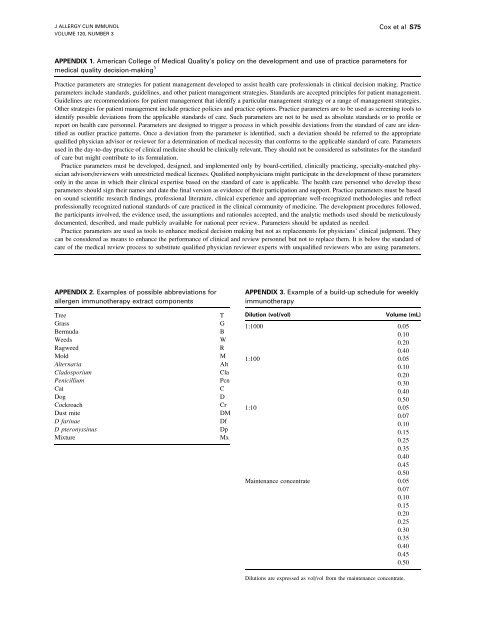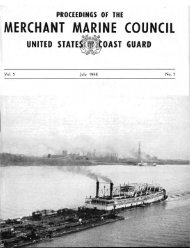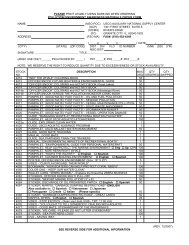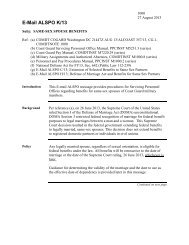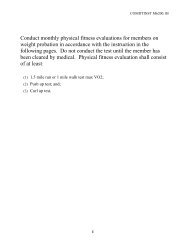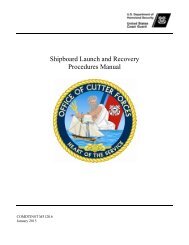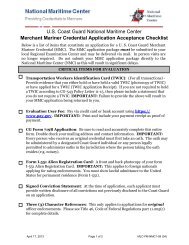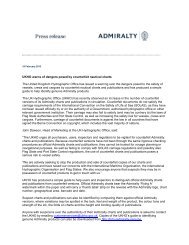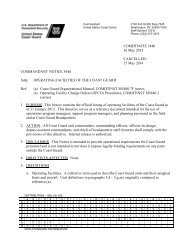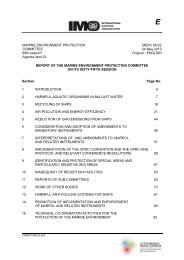Immunotherapy Safety for the Primary Care ... - U.S. Coast Guard
Immunotherapy Safety for the Primary Care ... - U.S. Coast Guard
Immunotherapy Safety for the Primary Care ... - U.S. Coast Guard
Create successful ePaper yourself
Turn your PDF publications into a flip-book with our unique Google optimized e-Paper software.
J ALLERGY CLIN IMMUNOL<br />
VOLUME 120, NUMBER 3<br />
Cox et al S75<br />
APPENDIX 1. American College of Medical Quality’s policy on <strong>the</strong> development and use of practice parameters <strong>for</strong><br />
medical quality decision-making 1<br />
Practice parameters are strategies <strong>for</strong> patient management developed to assist health care professionals in clinical decision making. Practice<br />
parameters include standards, guidelines, and o<strong>the</strong>r patient management strategies. Standards are accepted principles <strong>for</strong> patient management.<br />
Guidelines are recommendations <strong>for</strong> patient management that identify a particular management strategy or a range of management strategies.<br />
O<strong>the</strong>r strategies <strong>for</strong> patient management include practice policies and practice options. Practice parameters are to be used as screening tools to<br />
identify possible deviations from <strong>the</strong> applicable standards of care. Such parameters are not to be used as absolute standards or to profile or<br />
report on health care personnel. Parameters are designed to trigger a process in which possible deviations from <strong>the</strong> standard of care are identified<br />
as outlier practice patterns. Once a deviation from <strong>the</strong> parameter is identified, such a deviation should be referred to <strong>the</strong> appropriate<br />
qualified physician advisor or reviewer <strong>for</strong> a determination of medical necessity that con<strong>for</strong>ms to <strong>the</strong> applicable standard of care. Parameters<br />
used in <strong>the</strong> day-to-day practice of clinical medicine should be clinically relevant. They should not be considered as substitutes <strong>for</strong> <strong>the</strong> standard<br />
of care but might contribute to its <strong>for</strong>mulation.<br />
Practice parameters must be developed, designed, and implemented only by board-certified, clinically practicing, specialty-matched physician<br />
advisors/reviewers with unrestricted medical licenses. Qualified nonphysicians might participate in <strong>the</strong> development of <strong>the</strong>se parameters<br />
only in <strong>the</strong> areas in which <strong>the</strong>ir clinical expertise based on <strong>the</strong> standard of care is applicable. The health care personnel who develop <strong>the</strong>se<br />
parameters should sign <strong>the</strong>ir names and date <strong>the</strong> final version as evidence of <strong>the</strong>ir participation and support. Practice parameters must be based<br />
on sound scientific research findings, professional literature, clinical experience and appropriate well-recognized methodologies and reflect<br />
professionally recognized national standards of care practiced in <strong>the</strong> clinical community of medicine. The development procedures followed,<br />
<strong>the</strong> participants involved, <strong>the</strong> evidence used, <strong>the</strong> assumptions and rationales accepted, and <strong>the</strong> analytic methods used should be meticulously<br />
documented, described, and made publicly available <strong>for</strong> national peer review. Parameters should be updated as needed.<br />
Practice parameters are used as tools to enhance medical decision making but not as replacements <strong>for</strong> physicians’ clinical judgment. They<br />
can be considered as means to enhance <strong>the</strong> per<strong>for</strong>mance of clinical and review personnel but not to replace <strong>the</strong>m. It is below <strong>the</strong> standard of<br />
care of <strong>the</strong> medical review process to substitute qualified physician reviewer experts with unqualified reviewers who are using parameters.<br />
APPENDIX 2. Examples of possible abbreviations <strong>for</strong><br />
allergen immuno<strong>the</strong>rapy extract components<br />
Tree<br />
Grass<br />
Bermuda<br />
Weeds<br />
Ragweed<br />
Mold<br />
Alternaria<br />
Cladosporium<br />
Penicillium<br />
Cat<br />
Dog<br />
Cockroach<br />
Dust mite<br />
D farinae<br />
D pteronyssinus<br />
Mixture<br />
T<br />
G<br />
B<br />
W<br />
R<br />
M<br />
Alt<br />
Cla<br />
Pcn<br />
C<br />
D<br />
Cr<br />
DM<br />
Df<br />
Dp<br />
Mx<br />
APPENDIX 3. Example of a build-up schedule <strong>for</strong> weekly<br />
immuno<strong>the</strong>rapy<br />
Dilution (vol/vol)<br />
Volume (mL)<br />
1:1000 0.05<br />
0.10<br />
0.20<br />
0.40<br />
1:100 0.05<br />
0.10<br />
0.20<br />
0.30<br />
0.40<br />
0.50<br />
1:10 0.05<br />
0.07<br />
0.10<br />
0.15<br />
0.25<br />
0.35<br />
0.40<br />
0.45<br />
0.50<br />
Maintenance concentrate 0.05<br />
0.07<br />
0.10<br />
0.15<br />
0.20<br />
0.25<br />
0.30<br />
0.35<br />
0.40<br />
0.45<br />
0.50<br />
Dilutions are expressed as vol/vol from <strong>the</strong> maintenance concentrate.


